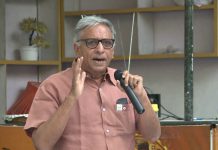It is irrational to perceive that only a few among the ulama have studied Islamic theology thoroughly and that group only own proper understanding of religion and rest of the ulama who do not agree with their particular views or explanations, have no sense of Islam or religious understanding at all. Some ulama go to an extreme extent claiming that those of their counter parts who disagree with them did not learn the religion properly, lack in Islamic spirit, and are derailed from mainstream teachings of Islam.
Such a concept does not mean any worth in Islam and it is also not rational to expect from all ulama to follow the guidelines outlined by a certain group or institution without back and forth, and without using their own intellect and wisdom. Islamic theology is open for all to understand and introspect, obviously being within the preset perimeters. There is no monopoly of any group or sect over Islam and its teachings. It is quite absurd to consider opposing opinions as irreligious, sinful, and astray, on the basis that certain groups or individuals do not remain stick to a particular self-sketched line drown by a particular set of ulama or religious scholars.
This sort of being hard-liner in views is obviously representative of extremism in thoughts and arguments, and this tendency has always yielded negative outcome for the common masses and also pushed the entire ummah to the edge of great losses in the past. The contemporary changes and challenges, both earnestly demand ulama to address and readdress the issues with all possible vigours, researches and by using modern technologies, if required, in order to guide the community in better and practical ways.
An Islamic ruling on any non-living subject or object is passed on the basis of contents in it, its possible impact on overall human society, and on the method and means of use or misuse by the owner or the users. Generally no tool is good or bad when it is invented, it is the use or misuse of that object, later, which invokes a verdict on a human only. A knife is an object which can be used for different purposes. It can be a tool to cut vegetables and fruits, it can be a self-defense weapon and also it can be a means to harm and kill an innocent person. Similarly, a mobile phone is a modern object which is originally invented to meet communication needs. It can also be used as a device for watching porn or doing sinful and immoral acts. The legal and Shariah verdict comes for the owner or the user of the knife or the mobile on their uses or misuses, not over the poor tools or means of any act.
TURKISH DRAMA DIRILIS ERTUGRUL
The drama Dirilis Ertugrul or Resurrection: Ertugrul is produced by and broadcasted in Turkey. It has completed its full five seasons on air in five years – between 2014 and 2019 and now its follow up TV serial – Kurulus Osman is being put on air by the TRT1 in Turkey. The producer himself claims that it is a drama based on history. It means, it is not complete history and entertaining components might have been scripted into the original stories. Similarly, the director, the actors and the telecasters are not claiming that the drama is completely Islamic. So it would be amateurish to peep into a piece of art and try to pin whether the characters in the drama have offered five daily prayers in the congregation or not and whether the pages of history are in full coherence or not with the storyline in the drama. The piece of art – Dirilis Ertugrul does not invite a verdict of Islamic jurisprudence or a legal order, neither on the contents nor on the ways of presentation.
However, the Drama Dirilis Ertugrul is indirectly a response to all the Western movies, dramas, serials, novels and literatures that deliberately tried to distort facts and present Islam and Muslims in bad lights to create dismay among Muslim youths and to disturb them mentally through nudity, obscenity and lies for their vested interests. This is an alternative to the prevailing contents that Muslim youths have been feeding on for almost a hundred years. Feeding on false materials, with moral and spiritual degradation, the youths are finding solace in fallacies, leaving behind their sound and solid ancestral grounds – be it religious or cultural.
Those who already have been watching films, serials and TV shows online or offline are precisely the targeted audience of this drama. This is simply one more addition in the vast film and art industry in the world with an effort to uphold some Islamic values intact to attract the target audience. This is art versus art and nothing more.
In this drama classical Turkish poetry is played in place of music and avoided bold dance or loud contemporary song bites. War music or old tone-beats are played in the beginning or when needed. The costumes used for each character of Muslim man and woman, whether acting in a negative or positive role, is filmed in inappropriate attire.
Besides getting extraordinary popularity in the Muslim world, the drama Dirilis Ertugrul has widely been accepted in parts of the Western world too. It is being watched with same emotion and enthusiasm in the West as in Turkey, most Arabian countries and Muslim populous Asian ones. Its English, Arabic and Urdu subtitled versions are also among the immensely popular online serials in the world, viewed through Netflix, YouTube, or Facebook platforms. An Urdu dubbed version under the title of ‘Ertugrul Ghazi’ is being re-telecasted by Pakistan’s official channel – PTV since the first Ramadhan 1441 AH (25 April 2020) is breaking records of viewership, both online and offline.
The drama has presented Islam as a religion of peace and justice and those who follow the teachings of Islam are portrayed as strong and brave characters. It offers lessons on how to stand firm against atrocities and at the time of crisis and hardships. It also beautifully depicts many Islamic values such as seeking help from Allah (swt) for own pleasure and for remaining steadfast in the right path, and availing guidance from the glorious Qur’an and Seerat of prophet Mohammad (saws) in sorrow and pleasing times. Moral aspects such as respecting women, elders, attaining spiritual insights from ulama and God-fearing figures and upbringing children are also given prime focus in the drama.
The actors and actresses in this drama are common artists from Turkish film industry. Their personal lives are not like the characters, they played in this drama, and this is common sense. They have of course, worked or are working in other films and serials in the past and even now. Their roles and characters in other dramas, films or series are not like the roles they played in this drama. They were and are merely doing their professional jobs and acting according to the instructions from the director or as per the written scripts. They neither call themselves as Islamic preachers nor claim to be religious and followers of Islamic Shariah in letter and spirit. They neither can claim so nor does anybody expect the same from them. We do not know what their intentions are or what one does in his or her personal life. However, many of them were seen praying, fasting and performing Hajj in real life and were also warmly welcomed by the Arab youths during the Hajj period.
WHY THE POLITICAL WEST AND THE ARABS ARE UPSET ABOUT DIRILIS ERTUGRUL?
This is a fact that the Drama Dirilis Ertugrul has influenced many in the West. It inspired some for deep study of Islam and ultimately embraced it as their new faith. It appealed some others for an unbiased study of Muslims’ geopolitical history and drew their own conclusions. This influence is continued till date and increasing each day which can be observed going by the feedback shared on social media by those who watched the drama Ertugrul. The political West, which had been in cross with Turks since the fall of Constantinople (modern Istanbul) in 1453 CE and following the defeat of Ottoman in the First Ward War in 1918 CE, is concerned because the drama is revealing a few truths about what they have been smartly hiding since long and falsely propagating against a particular culture and religion. In addition to this, modern Turkey began to establish its presence in the contemporary film industry, wherein hitherto was complete monopoly of the West, with decanting alternatives and bangs. By watching this drama, Western youths are intellectually finding it uncomfortable to boast their cultural or civilization supremacy over other races of the world. Though it is a fiction and a drama only, yet it is able to successfully penetrate into some young minds, inviting them for introspections.
On the other hand, the Royal family of Al-Saud and its followers in the Arabian peninsula, who have been historical, the companions of the West and traitors for the Ottoman Caliphate, even the backstabbers for whole Muslim ummah since the First World War, who offered active support in the destruction of the Ottoman Caliphate as well as willingly handed over the land of Palestine in a platter to the Jews at the behest of Britain and the Western powers, are also in deep distressed because of the widespread popularity of the Dirilis Ertugrul and the Kurulus Osman dramas. The reason might be that the Arabs are getting a little bit of knowledge of history of past five-six centuries with an alternative narrative by help of these dramas. The dramas are gradually developing intimacy and shunning enmity between the Arabs and the Turks. Turkey and the Turkish film industry is financially gaining and earning popularity in the Muslim world. The Arab youths are also watching this serial via social media with full interest and loving it. They keep eagerly waiting for the next episode every week. They are also finding it uncomfortable and illogical to sustain enmity with Turks and boast supremacy of Arabs over non-Arabs. These assumptions, if real, would be obviously uninviting for the political classes in the Arabia.
To check the impact of Dirilis Ertugrul serial and its influence on society, a few Arab countries along with some Western countries first tried to link it with extremism and ban it completely, but they failed to do so because of social media availability in all households. Afterward they filmed an Arabic serial to counter it, that attempt also went in vain. They are also propagating that this drama is historically wrong and is a conspiracy of Turkey against the Arabs. However, the Arabs and youths in the West and East are not taking this anti-art propaganda seriously and enjoying this new type of action on their TV and mobile screens.
WHY FATWAS ARE PARTICULARLY SOUGHT ABOUT DIRILIS ERTUGRUL?
The drama Dirilis Ertugrul has been on air since 2014 but a new phenomenon is observed recently since the year 2020 begins. It seems that some influential political powers are trying to misuse Islamic scholars, muftis and well-known religious institutions afresh in their campaign against the drama Ertugrul while keeping them in dark. Their paid or unpaid trolls might be planted to ask fatwas from reputed muftis and institutions about watching this drama in line with general sort of films and dramas. Obviously, majority of the present-day Indian sub-continental ulama would opine that watching any kind of film or drama on television or mobile is haram (forbidden) in Islam. The serial Ertugrul is a movie where living images, graphics and video shootings are used, where adult male and females are frequently intermingling; indulging in such activities is also a waste of time (a’bus) thus against Islam and must be avoided. Therefore, those who would watch the drama Dirilis Ertugrul will be committing haram and a sinful act.
Such fatwas might be used as new weapons against that particular drama and make the campaign against it a religious issue among Muslims to stop new audiences. Fatwas of reputed institutions or popular scholars do have some impact among their followers and a certain practicing class of Muslims in the world. Here some muftis are consciously or unconsciously might be made a party in the ugly campaign against a particular piece of art which politically does not fit to the taste of some powerful countries in the world. These powers have actually nothing to do with fatwas or Islamic practices, they simply wish to defuse the influence of Dirilis Ertugrul from people’s minds and stop all upcoming projects which might showcase Islam and Muslims in good lights and present friendly relation between Arabs and Turks in the centre stage.
However, the fatwa sought and delivered against the drama Dirilis Ertugrul will not have much impact on the popularity of it because it is already immensely popular cutting across languages and geographical borders and those who have already been watching films, dramas and TV serials, have not been doing it by asking mufties, or the ones watching this particular serial are aware what they are doing and why. Nevertheless, such fatwas are ardent invitations for Muslim scholars to introspect over their roles and draw future strategies and plan well in the light of past and present experiences. It is time to analyze how the modern media, which is the most powerful means of reaching-out to people and preaching one’s views, can be used in fruitful ways.
DIFFERENCE BETWEEN DIRILIS ERTUGRUL AND OTHER TURKISH DRAMAS
In addition to Dirilis Ertugrul there are many other romantic, historic and action serials and films produced by Turkish film industry. Some of them are being played all over the world with multilingual subtitles or dubbed in different languages. Kara Sevda or Endless Love, Layla and Mecnun – dubbed in Urdu/ Hindi as Layla Majnu and Muhteşem Yüzyıl, dubbed in English as Magnificent Century and in Urdu/Hindi as Mera Sultan are some of the popular dramas, to name a few, produced by Turkey and gained viewer acceptance across continents.
Magnificent Century or Mera Sultan is also based on a historical period during the Ottoman Caliphate, especially, it is about the life of Ottoman Sultan Süleyman the Magnificent, the longest-reigning Sultan of the Ottoman Empire, and his wife Hürrem Sultan, a slave girl who became a Sultana, but, neither the Arabs nor the Westerns objected on it or on many other such serials. The reasons they know better, but what we can understand is that there is a cosmic difference between the drama Dirilis Ertugrul and other dramas produced by the contemporary Turkish film industry. One prime difference is that this drama was influenced and perhaps instructed by the present ruling party of Turkey headed by President Recep Tayyip Erdoğan unlike all other dramas from the Turkish industry.
All other dramas including Mera Sultan were filmed and choreographed in absolute Western tunes and tastes, which contain the elements of nudity, illegitimate romance and exciting colors in the stories to thrill the audience, as common in all film industries. Islam or Islamic moralities were not depicted in those dramas with prime focus; or the bravery of any peasantry Muslim tribe was not exposed in any of them. Mera Sultan, for instance, tried to demonstrate the glory of Ottoman Empire while diminishing the moral or religious fine-tuning completely. It showcased the beauty of women in the Sultan’s harem and put heavy lights on disputes among Christian, Jews and Muslim harem members who killed their owns and plotted conspiracies against each other and even against the Sultanate.
Arguably there is no objection on those dramas, neither from the Arabs nor from the Western powers and no one is asking any mufti or an institution for a fatwa on their permissibility in the light of Islam and Shariah! The political West and the royal Arabs are only worried about the drama Dirilis Ertugrul and others on this sequence and a few naive people are asking fatwa only about this one which comparatively presents Islamic morals, traditions and practices of common Muslims in positive notes though dramatically!
AN ALIM IS ENTRUSTED TO APPLY HIS MIND BEFORE HE ACTS
Every alim (a Muslim scholar) who is bestowed with religious insights should and deserves to examine a fatwa with his knowledge and rational, being in line with the spirit of Islam and its wisdom, and keeping the conditions and contemporary challenges in mind; before he takes it into practice or an acceptable expert opinion for him. No matter how great a personality is or how famed an institution is, no individual and no institution should be beyond scholarly scrutiny. It is bizarre, ridiculous and would be a sign of utter arrogance and monopoly over Islamic theology if any mufti, religious scholar or institution degrades the one who tries to apply his wisdom and examines their delivered fatwas on merits or even disagrees with certain declared opinions.
Urdu books like Dastan Iman Faroshon Ki by Inayatullah Altamash and Tariq Bin Ziyad by Aslam Rahi etc. are only historical fictions, in which the writers presented drama, love and romance, emotion, action, and bravery of believers and farsighted stories of Muslim heroes along with exaggeration in real history. A reader knows it well, what he or she is reading is not Tafseer, Tasawwuf or pure Islamic texts; rather it is a fiction only with creative imaginations and spicy exaggerations. I do not say that after reading such books one may be more religious or pious but I can bet that reading such books will defiantly boost one’s academic insights. If a mufti or a scholar is not personally inclined towards literatures or not interested in drama or fictions and he considers these subjects as dissipate, he is free to do so. However, if he says that though it does not contain any material of morel degradation, still it is a waste of time and it ‘may’ take the reader from virtuous deeds thus reading such books is a sin, then he himself needs to open his mind and go further deep into Islamic jurisprudence (Fiqh).
Every alim who is gifted with the power of intellect, knowledge and wisdom cannot deny the fact that arts – drama, plays, fiction, novel, poetry and storytelling are essential components of any culture and established civilization. Though arts and traditional cultures are not parts of Islamic faith, but of course these are distinct identities of thriving communities and living nations in the length and breadth of the earth. Thus, Islam prefers to remain silent about arts and culture unless there is something or certain practices which stand in clear contrast with defined Islamic teachings, its monotheistic belief or evidently against human interest and common sanity.
CONTEMPORARY MEDIA AND MUSLIMS
It is an undeniable truth that present-day electronic media – news channels, entertainment channels, films and serial – offline and online, are the most effective and influential means to set public opinions to right or wrong directions. Today, a vast majority of people are connected with mobile or 4G networks. Mobile is now an integral part of human life except for some who live in remote lands or beyond common human inhabitations. Video conferencing, video calling and sharing video clips on social media are just common. Social media, particularly YouTube and Facebook live are being used for Dawah work by a number of internationally acclaimed ulama. Live Dua seasons, religious gatherings and spirituals majalis (sittings) are being telecasted through social media platforms and modern gadgets by certain mainstream ulama.
Whosoever is using smart phones this day is indulge in watching movies or films. Whether you like it or not, some video clips keep flashing on your screen in some or the other ways. You can hardly avoid the commercials on your screen even if you are busy doing professional work online. All these are films or movies (moving pictures) – some are created professionally while others are recorded unprofessionally by individuals. However, every set of moving images we watch on WhatsApp or Telegram is a film. The moving or animated set of digital picture is called a movie or film. Film is also the name of the reel which preserves the animated or unanimated images. Can we ask ourselves, how many of us are not watching these categories of movies or films nowadays? Are the modern-day ulama not using smart phones?
In the near future, the animation technology will further develop drastically. The world is going to get a makeover very soon as far as information and broadcast technologies are concerned. When soft screen, laser technology, multi-dimensional image technology, mono technology and robotic use of living beings will be common, then present television, print media and radio technology will certainly be in different forms. Some of them are going to be permanently adorned in museums. In the upcoming days, digital images – motion or fix and videos – films and movies will be an integral part of human life. All transactions and communication, learning and teachings will integrate digital means as integral components of their systems, where both types of pictures – animated or non-animated, will be parts of the system. There will be no alternative to people without availing these technologies in full or part.
What should be the fatwa of religious scholars considering the imminent inventions? Farsighted ulama should be able to at least look at where the world will be after ten years from now in terms of technology, if not too far. It is imperative for the scholars, jurists and major religious institutions to review their past verdicts on digital photography and motion picture in view of the present and upcoming needs vis-à-vis challenges being within the Shariah principles only.
LET’S NOT COMMIT THE PAST MISTAKES AGAIN
It is noteworthy that for almost three hundred years, Muslims were confused in deciding whether today’s printing press is permissible for publishing books or not. In the Ottoman Caliphate period itself, some narrative goes as ulama had issued a fatwa declaring it impermissible and those who opposed the order were persecuted as criminals and sinners by the rulers. “In 1515 the Ottoman Sultan Selim I, persuaded by the influential clerics of the realm, issued a decree that imposed death penalty on anyone using a printing press, invented in Germany in 1455, to print books in Turkish or Arabic,” this and similar arguments are in prevalence in reference to printing press in Ottoman era. However, this historic narrative is contested by a few contemporary Muslim scholars leveling it as untrue and one more historic lie against the Ottoman.
Nevertheless, there are multiple other arguments to ascertain that there was a strong opposition from Muslim religious scholarship to welcome that technological invention then, obviously that was on religious grounds. Even the powerful Mughals were reluctant to use and welcome printing press technology in their reign in India. Portuguese ruled Goa got the first printing press in the year 1556 CE. In 1670 CE the first printing press was introduced to Mumbai (then Bombay). This was followed in Tamilnadu, probably in 1714 CE and Kerala saw a printing press in 1800 CE only.
Strikingly all those printing presses were brought and established either by The East India Company or by Christian missionaries to print Bible in different languages only. The first Qur’an printed was in Venice of Italy in 1537/1538 CE for merchandise purpose in the Ottoman market by Christian missionaries! These tow facts make it lucid to draw a conclusion as where the Muslim scholarship and ruling classes were standing then in the face of industrial advancement.
Due to lack of farsightedness in regards to then developing industrial and academic technologies and due to being failed to analyze the then challenges, irreparable damage caused to Muslims as a whole which is still hunting. During the period between 15 and 18 centuries, the West made the best use of its new invention – the printing press and produced printed books with previous works and researches or observations on science, technology and medicine in textual theories as well as in observatory diagram forms, which included all major works done by Muslims in these fields in their Golden Age earlier. The Muslim Golden Age was a period of cultural, economic, and scientific flourishing in the history of Islam, dated from the 8th century to the 14th century. The industrially developing west then published the researches and manuscripts of Muslim scholars and scientists along with its own ones either under the names of their own researchers only or undercoating the Muslim names in English or French tunes only.
In the following centuries since the 18th century, extraordinary geopolitical changes had taken place in the world, especially when the Britain emerged as the dominant political power in the world at the cost of Muslims’ debacle in the field of economy, science and academy which altogether severely influenced all upcoming battlefields in the 18th and 19th centuries against Muslims. Consequently, Muslims are nowhere to be seen in the frontline in the fields of modern science and technology, except a few names that too discovered by scratching books published in the West. Muslims had fallen virtually three centuries behind in the field of modern science and discovery in the 18th century itself; and the gap is incessantly widening each passing days between the modern West and the Muslim world.
Let’s sneak a look at the recent past; just a hundred years from now, one of India’s most prestigious religious seats of learning had issued a fatwa that the use of loudspeakers (mikes) during Salah (five daily prayers) for bigger sound was not in tune with Islamic teachings, thus impermissible to be used. Here, within a span of less than hundred years, all religious institutions, including the one issued the verdict in negative about use of modern sound system in Salah itself had to change the previous stand and are now practically using latest sound system in all their masjids. There are many such other examples to put forth; nonetheless, finding a list of faults in the past will not cause benefits to any; two examples are cited to draw a clear conclusion by the generous scholars of Islam.
The two instances make it clear that with the changes in times and following the realization of an object and its major functioning, ulama have also changed many of their previous fatwas. It is but Islamic to offer an opinion according to one’s knowledge and wisdom, however, when an alim finds a more inclusive and wise arguments within Islam, he does not shy away from it simply because it is coming from a lesser known or a small corner.
No one can refute this reality that muftis are among humans, they are mere interpreters of the Islamic laws in certain terms; they are neither Shariah nor its unchallenged authority. They can make mistake and go wrong in understanding a particular matter along with its positive and negative impacts; and may find it difficult to analyze various complicated issues in all perspectives. They can be incorrect in issuing fatwa on a particular subject matter and may backtrack from their position later but some wrong fatwas may cause irrevocable damages and great losses for the entire ummah forever. All errors are not simply mistakes, some are grave blunders with prolong negative impact.
Watching obscene movie, in general, is unlawful among all ulama without any exception. However, there would be and there must be clear lines now in reference to digital images, movies, or film. All motion pictures cannot be haram now; else all those using smartphones will be committing haram and sins! The blanket fatwa on drama Dirilis Ertugrul from religious institutions or individuals was uncalled for, misplaced and needs a comprehensive case study for a review in the decision. Religion might be on play for a negative political campaign from behind the curtain and the muftis might be completely out of the loop.
However, the contemporary challenges and needs call for serious introspections and retrospections by the crowd of ulama about digital imageography – motion or not, and modern communication technology – the electronic media. In Islam the balanced view is always considered to be appropriate. There are two extreme viewpoints about the use of multimedia mobile. On one hand, an alim asks his followers to not keep multimedia mobile in the pocket when offering prayer even if it is in switched off mood, else the prayer will be invalid; he justifies saying that there are pictures of living beings in the phone and picture (tasweer) is uncompromisingly haram (forbidden) in Islam. While on the other hand, there is an ultra-advanced alim who went on issuing fatwa in the light of his so-called intellect and unchecked rationalism in this Covid-19 lockdown period that Salah will be valid if one follows an imam online via video conferencing or social media.
Both these views are examples of extremes – ‘ifrat wa tafreet’ (extremism from both ends). For the betterment of ummah it is the collective religious duty of scholars and responsible institutions to come up with a practical, useful and better strategy for future, which must be outlined at right time and made executable at right places.
Present Turkey, without repeating its past mistake of the Ottoman era, trying to use modern media technology in its strength for a positive outcome. It is indubitably a wroth applauding and an important initiative that be followed by other Muslim countries in the world.
Electronic media – news channels, film, serial, drama, talk shows or reality shows etc and other advanced means of communication which will be available in the broadcast and telecast industry in the upcoming days will be louder and more effective means for mass communication. Earlier, in the long past, the blunder of denouncing some particular scientific, industrial and communication inventions had already been committed, now it is time to fill in some civilization gaps, partly caused by the lack of wisdom and because of failing to take right decisions at right times.
It is neither wise, nor in the interest of ummah to repeat the past mistakes of failing to do proper researches for finding appropriate results. Presenting rutted ideas in the glamorous attire of Islam will be nothing more than an effort to cripple the fluttering wings of ummah in the guise of religion. Let’s not commit the past mistakes ever in the history of the ummah. Let’s make smart moves and take steps in advance.
The author M. Burhanuddin Qasmi is an alumnus of Darul Uloom Deoband and Editor Eastern Crescent, Mumbai. This piece of article was originally written in Urdu which is translated by Muaz Muddassir Qasmi of MMERC, Mumbai on demand from a section of readers and edited with new imputes by the author afresh. Views are personal.

















